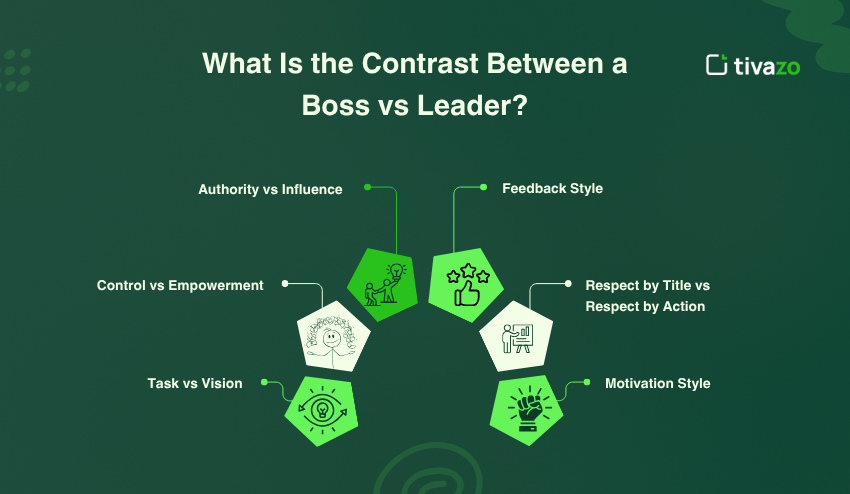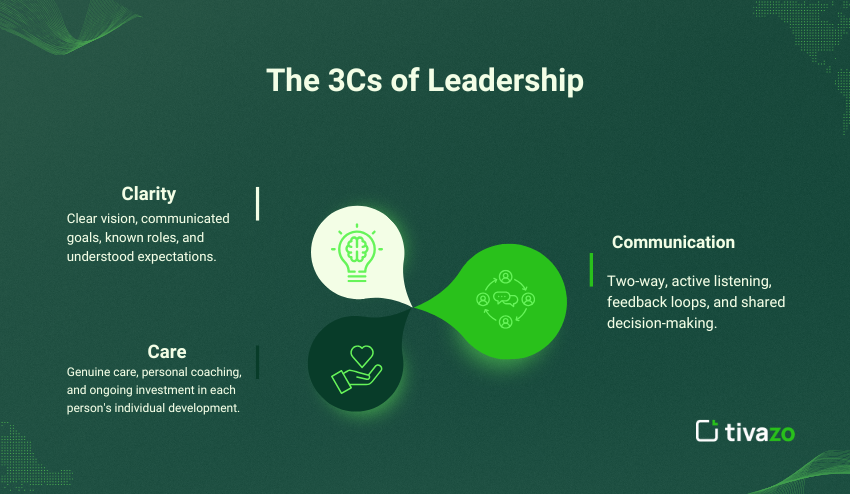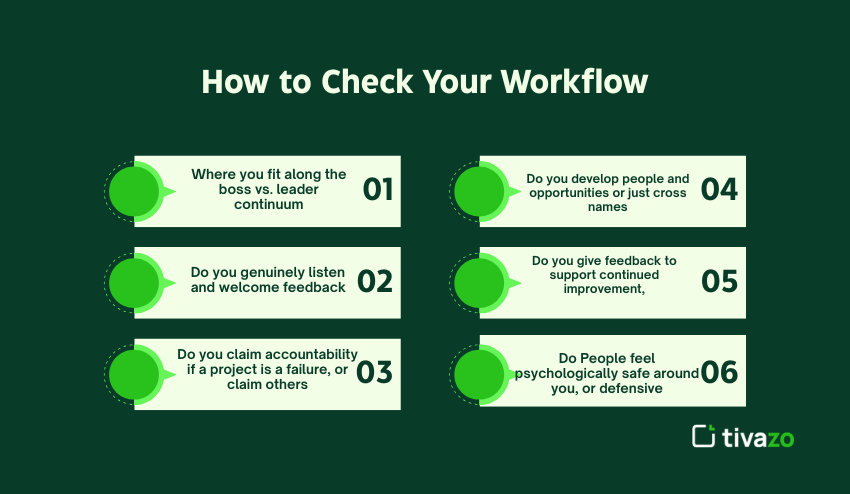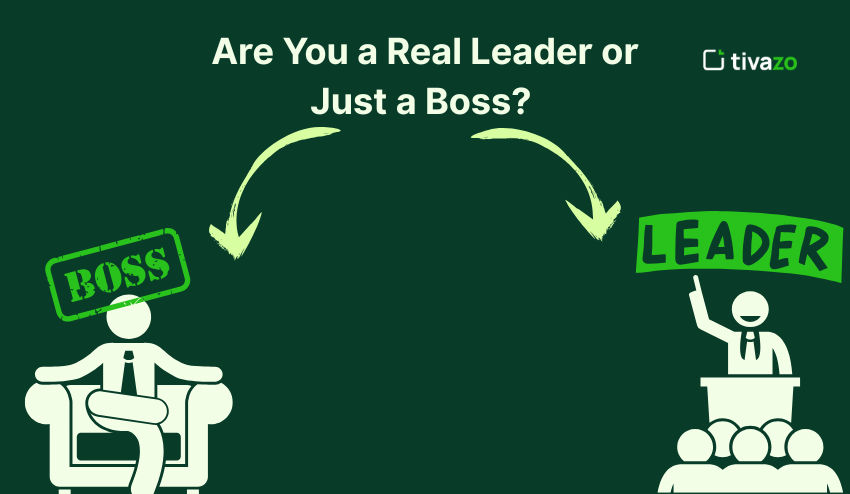The difference between a boss and a leader is more than just academic; it has a significant impact on overall company culture, team performance, innovation, and ultimate success and growth. It doesn’t matter if you are working with a team of 2 or managing an entire department; your management style has a cascading effect on all direct reports and those that they lead. At Tivazo, we do not believe you should have to choose between being a boss or being a leader; it should be a strategic
The boss vs leader approach extends much further than your title. A boss has power; a leader earns respect. A boss drives compliance through timelines; a leader drives compliance and results through inspiration, purpose, passion, clarity, and feedback, personal touch and respect, and two-way communication instead of top-down direction.
At Tivazo, we know we can always improve and build a leadership culture that encourages transparent communication, holding each other accountable, and empathizing with all employees. We have witnessed time and time again that employees and teams led by leaders, not bosses, are vastly more engaged, productive, and innovative.
This blog is about the boss vs leader construct in detail, the essence of where the true power lies, how Tivazo measures our leadership initiatives and outcomes, the 3Cs of leadership, the 5 biggest distinctions, and then ultimately a reflection of where you sit and if you are a true leader or just a boss.
Key Highlights:
- What Is the Contrast Between a Boss vs Leader?
- Who Has More Power, A Boss or a Leader?
- The 3Cs of Leadership
- Are You A Leader or Just A Boss?
- Difference Between a Boss and a Leader: 5 Major Differences
- What is a Big Leader or Boss?
What Is the Contrast Between a Boss vs Leader?
Identifying the distinction between boss vs leader is significant in creating team culture and building organizational culture. Here are some of the key differences:
Task vs Vision
- The boss manages tasks, timelines, and compliance with rules.
- The leader inspires, guides, and aligns people to a shared vision and purpose beyond just the tasks.
Control vs Empowerment
- The boss uses control: “Do it because I said so.”
- The leader is about empowerment: “How can we work together to achieve the best outcome?”
Authority vs Influence
- A boss uses positional power to get things done through hierarchy.
- A leader uses trust, emotional intelligence, and actions to create influence.
Feedback Style
- A boss does top-down criticism without context or support.
- A leader says, “Follow me because you believe in where we are going.”
- A leader engages and has an open discussion that is constructive and focuses on the learning and development opportunity.
Respect by Title vs Respect by Action
- A boss demands respect because of their job title.
- A leader earns respect by being of service to others and leading by example.
Motivation Style
- A boss motivates through pressure, deadlines, and maybe fear, based on their position.
- A leader motivates through inspiration, trust, and personal investment in each team member.

Who Has More Power, A Boss or a Leader?
The question “who has more power, a boss vs leader?” is not so black and white—it has many layers and is dependent on context.
A boss has positional power—power that comes from their title, ranking, or position within the organizational hierarchy. The authority comes from the structure and the walls around them, and most of their influence is rules, expectations, and consequences. A boss can say, “Do this because I am your boss.”
A leader has influence power earned through establishing credibility, communication, empathy, and vision. A leader does not depend on their title to require following. They build trust and support through voluntary action. A leader says, “Follow me because you trust this direction So, who has power in the long run? A boss can compel action in the short run, but a leader builds sustainable loyalty and performance. Leadership power is sustainable. Leadership power leads to motivation based on internal determination, rather than fear or obligation.The concept of boss vs leader can be hard to understand but as a observer towards a certain person we know if that person is a leader or a boss.
At Tivazo, we experience this every day. The most impactful team members are not just those with the most prestigious titles, but they are the people to whom others naturally turn for guidance, support, and inspiration. These individuals do not necessitate making a lot of noise to be heard; their leadership demonstrates itself in action, trust, and results.
This is why at Tivazo, we are focused on growing leaders at every position, rather than just giving someone authority. We aren’t just assigning power; we are developing influence.
The 3Cs of Leadership
In addition to our name recognition, we use the 3Cs of leadership to provide a framework for how we evaluate leadership, develop leadership, and support leadership at Tivazo. The 3Cs is a simple yet powerful model to set explicit expectations around leadership behavior and mindset, particularly in contrast to boss vs leader.
| C | Description |
| Clarity | Clear vision, communicated goals, known roles, and understood expectations. |
| Care | Genuine care, personal coaching, and ongoing investment in each person’s individual development. |
| Communication | Two-way, active listening, feedback loops, and shared decision-making. |
A boss may just make demands without an explanation, but a leader embodies the 3Cs, making sure that people understand the “why,” feel like individuals, and are included in the process.
The 3Cs are part of our leadership development, performance review process, and team culture, so we help reinforce the 3Cs of leadership; we are working to develop our team so that they not only follow us, but in fact trust us, grow with us, and lead with us.

Are You A Leader or Just A Boss?
- Use these questions to assess where you fit along the boss vs. leader continuum:
- Do you genuinely listen and welcome feedback, or just tell others what to do?
- Do you claim accountability if a project is a failure, or claim others’ failure for it?
- Do you develop people and opportunities for future growth, or just cross names off a to-do list?
- Do you give feedback to support continued improvement, or when things go wrong?
- Do People feel psychologically safe around you, or defensive and anxious?
If you answered “yes” to the first part of each of these questions, then you have begun the path of a true leader. If you answered “yes” to the second part, there is a chance you are still operating from a boss’s perspective, which might be alright if you are open to development.

At Tivazo, we encourage all team members at any title to be self-reflective. We’ve learned just how impactful asking these questions can be when used for self-reflection, can expose blind spots, lead to improved communications, and develop leadership from the inside out.
Remember, becoming a leader is a journey and not a title. And every step away from just being a boss brings you closer to inspiring and actively creating a lasting impact on those you guide.
Difference Between a Boss and a Leader: 5 Major Differences
In the table below, we highlight the distinctions between boss vs leader along five dimensions, with illustrations from Tivazo:
| Dimension | Boss (Tivazo Example) | Leader (Tivazo Example) |
| Mindset | “Because I said so.” | “What do you think, and how can we solve this together?” |
| Approach to Power | Command and control. | Together we make decisions through influence and consensus building. |
| Handling Mistakes | Blames the team | Takes responsibility, actively supports team to learn. |
| Style of Relationship | Stays distant; transactional | Invests in getting to know each other, growth. |
| Communication | Top down directives. | Two way listening, listening, feedback loops. |
This table details the differences between boss vs leader and shows how Tivazo is drilling down on leading behaviors over authority in our workgroups.
Once you understand these core differences about boss vs leader, your organization will have an opportunity to develop leaders, accountable managers, stronger teams, and sustainable cultures. These distinctions are not ideological. They are real in practice and context in terms of decision-making, conflict resolution, and team morale. Leaders lift; bosses push. At Tivazo, we believe that choosing leadership for the purpose of improving people, improves performance.
What is a Big Leader or Boss?
We all have certain public personalities we are familiar with in the business world. Some are bosses, who act as tyrants, issuing commands based on their power, authority, or title, and expect people to simply comply. On the other hand, there are leaders, with vision, trust, and action they inspire. In the boss vs leader debate, I think it is important to note that the measure of one’s influence is not always based on their position, but by the different ways people experience the person, and what results the impact has on people and their success.
The biggest leaders of all are those who cultivates trust at scale. They are followed not because they have to be, but because people believe in them. They know how to listen and listen deeply. They know how to adapt and adjust their approach to bring out their best results. Big bosses can command followers, but don’t build sustainable loyalty or real engagement.
At Tivazo, we understand that real leadership is not always the hierarchical authority at the top of the org chart. As we assess our most influential, respected, and admired individuals, they embody trustworthiness, authenticity, empathy, and accountability, and in addition willingness to lead by example in won mentorship throughout any winners’ circle they participate in by being able to put the team’s success in front of the own egos.
As to how trust builds up or frays, the differences of a boss vs leader becomes very important.
Are You a Real Leader or Just a Boss? Self-Test
Here is a simple self-test adapted to evaluate boss vs leader, based on competitive writings and actual leadership models:
- Do I acknowledge dissenting ideas and perspectives or do I shun the ideas to maintain control?
- Do I provide ownership and responsibility or do I assign tasks without providing empowerment?
- When things go wrong, do I say “my bad” and look for solutions or do I blame others calling it “their fault”?
- Do people say “they never listen” or do they say “they always listen and make me feel like I have been heard”?
- Do I spend time mentoring and developing others or do I simply push for results?
If your answers show that you exhibit more boss behaviors than leader behaviors, do not fret. Making the change from being a boss to a leader is a journey and not a destination. The first step is knowing.
At Tivazo, we have used this boss vs leader self-assessment as part of our leadership development programs.
By regularly asking ourselves these questions, we create space for learning opportunities, stronger relationships, and greater team engagement. In this boss vs leader debate, the first step toward sustainable impact is making the choice, boss vs leader.

Can you be both a leader and a boss ?
Certainly while there are boss vs leaders, the best managers are typically a mix of both and do both well. In management, a boss isn’t related to superior authority; a boss is just in a position of authority. A leader takes a position of authority to inspire, direct, and empower others. Combining the structures, duties, and responsibilities of a boss, with the empathy, vision, and influence of a leader is what matters. When we discuss being a boss vs leader it doesn’t have to be either/or. As an organization, we ask our team leads to combine both in order to drive results while also inspiring trust, fostering growth, and leading in a purpose driven manner.
Conclusion
In the argument of boss vs leader, the bottom line is simple: bosses manage tasks; leaders build people. Bosses may wield title and authority but leaders win hearts, minds, and long-term results. We chose to lead at Tivazo: we empower people, take ownership, and operate with clarity, care, and communication in mind.
Now I invite you to ask yourself: am I a boss or a leader? And then do something about it! Unlike bosses, leaders practice the three Cs of leadership; leaders move from command to collaboration; leaders change workplaces. The conversation of boss vs leader is more than theoretical; it is the future of success.
As we have indicated, the distinction between a boss vs leader does not only affect the team, but also the business. With the world of work constantly changing, the increase in emphasis on emotional intelligence and collaborative effort means understanding the differences between the two is more important now than ever. It is a difference between compliance and commitment; a difference between turnover and loyalty; a difference between stagnation and innovation. Leaders drive the change.




